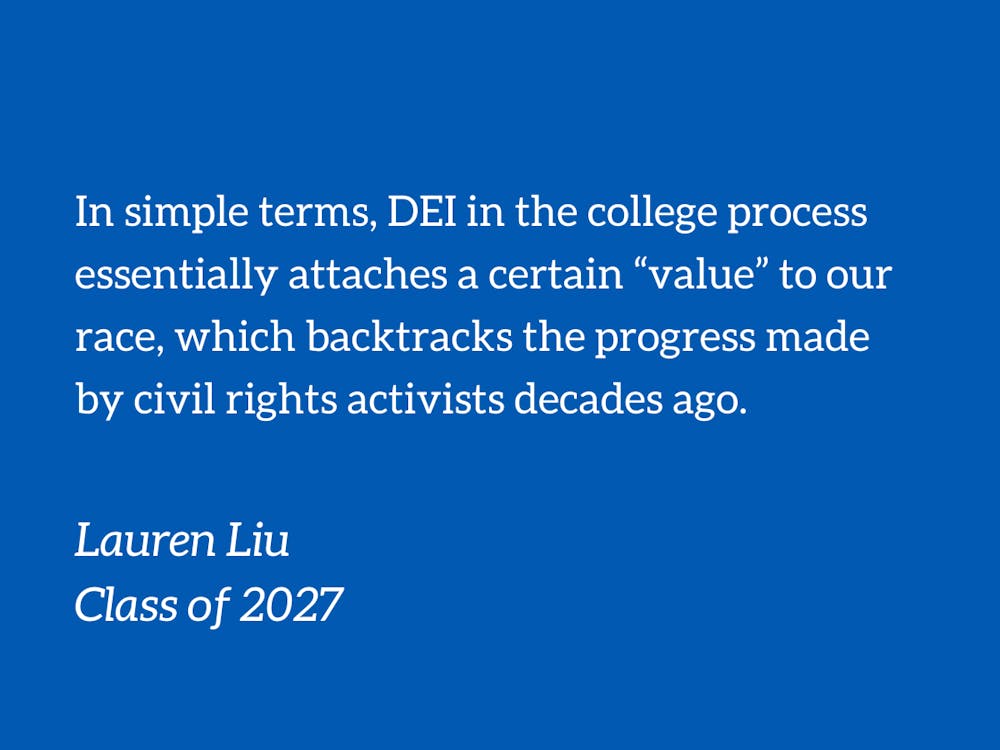On June 29, the Supreme Court ruled that the admissions criteria utilized by the University of North Carolina and Harvard violated the equal protection clause, bringing race-conscious affirmative action to an end. For many months since, the debate surrounding the ethicality of affirmative action has flooded national media. Most dialogue I’ve personally heard has involved the declaration of those against affirmative action as complicit in promoting white supremacy, or at least guilty of upending progress in equity.
I was torn.
As an Asian American, I’ve witnessed (and experienced first-hand) the ways in which the admissions cycle has unfairly assessed my community. Throughout the college application process, I constantly feared that I wouldn’t stand out amongst the other Asians who similarly had good grades and strong extracurriculars. On the other hand, I can also understand the overarching ethos of race-based affirmative action, which is to assist historically oppressed groups — those with fewer resources — in the advancement of their life, simultaneously increasing their representation on campus.
After much reflection and revising, I’ve taken my stance. I’m not here to talk about the model minority. I’m also aware that I can’t persuade staunch, hard-headed proponents of affirmative action to listen to me, nor do I intend to pick a bone with them. I merely intend to analyze the topic of discrimination logically, to hopefully persuade the reasonable reader of the adverse effects of race-conscious admissions.
Race-based discrimination inherently segregates the races. It insinuates that our race — how we look — is an important, differentiating factor of our identity. If the whole purpose of Diversity, Equity and Inclusion (DEI) initiatives was to encourage greater understanding of disparate races, it in itself signifies that we are different. In simple terms, DEI on the basis of race in the college process essentially attaches a certain “value” to our race, which backtracks the progress made by civil rights activists decades ago. Singular focus on race therefore divides America more than it unites.
That’s not to say racism is not an actual issue in this country. Throughout my life, I’ve had to worry about how others perceive my identity as an Asian American. Just the other month, a man in Harris Teeter hurled a series of racial slurs at me and my mother as we stood in the checkout line. Racism is very much alive in our country. You might be questioning, then, as I am right now: would omitting conversation about DEI altogether really improve racism? The facts of this I’m not sure. But there’s a fine line between educating one another to be accepting of who we are — regardless of race or other measures of outward appearance — and dividing us in doing so.
One could argue, then, that this logic could apply to sex discrimination as well. By extension of race, sex is a part of outward appearance (and doesn’t “define” who we are) and thus the admissions process should become sex-blind. Fittingly, the Baldwin Scholars program recently came under attack for excluding non-female students and allegedly violating Title IX provisions. Conversations about gender identity and societal constructs aside, a male and a female are intrinsically different from one another. We have completely dissimilar biological systems, identifying features and modes of operating. Taking into account sex in the college admissions process equates to considering differences that extend beyond mere appearance. An African American and an Asian American are not intrinsically different in any way, and saying so only reinforces the notion that we are separate groups.
With the recent publishing of a New York Times article exploring Duke’s lack of socioeconomic diversity, it occurred to me that class-based affirmative action ultimately makes more sense, logically and efficacy-wise, than race-conscious affirmative action.
What makes socioeconomic status a fairer criterion for judgment than race? Differentiating based on race would mean an African American from a wealthy family would be prioritized over an Asian American from a low-income household. If the whole purpose of affirmative action was to look after those with fewer resources, class is a more accurate determiner: the amount of money one earns directly determines, objectively, the amount of resources available. Class-based admissions would not only promote greater economic diversity but also, most naturally, continue to guarantee the diversity of the student body. Race is merely an unnecessary and unfruitful intermediate.
We can’t ignore that college is a business. The facilities that we love today — Bostock, Perkins, Lilly — all have a name attached to them. Ending legacy admissions would theoretically deter donors from providing the money that keeps Duke functional and enjoyable. It’s also unrealistic to assume the children of large donors will never not get a leg up in the admissions process, which undoubtedly facilitates another level of injustice. Ethically speaking, I’m a firm believer that people should do as they wish with their hard-earned money. However, a realistically fair class-based affirmative action process should set a cap on the number of donor admits accepted (a topic I will explore more in depth at a later time).
When it comes to the college admissions process, we need to provide a multifaceted review of its effects. We need to break out of our self-conducting echo chambers of anger and resentment towards racial relations in America and start thinking logically. I encourage the Duke community to reflect on the meaning of race in various spheres of their life, though the conversations are complex and personal, perhaps even uncomfortable.
Let’s get talking.
Lauren Liu is a Trinity first-year. Her columns typically run on alternating Tuesdays.
Get The Chronicle straight to your inbox
Sign up for our weekly newsletter. Cancel at any time.

